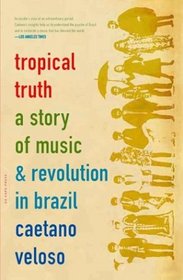Search -
Tropical Truth: A Story of Music and Revolution in Brazil
Tropical Truth A Story of Music and Revolution in Brazil
Author:
Inadequately described as the John Lennon or the Bob Dylan of his country, Caetano Veloso has virtually personified Brazilian music for thirty-five years. Now, in his long-awaited memoir, he tells the heroic story of how, in the late sixties, he and a group of friends from the Northeastern state of Bahia created tropicalismo, the movement... more »
Author:
Inadequately described as the John Lennon or the Bob Dylan of his country, Caetano Veloso has virtually personified Brazilian music for thirty-five years. Now, in his long-awaited memoir, he tells the heroic story of how, in the late sixties, he and a group of friends from the Northeastern state of Bahia created tropicalismo, the movement... more »
ISBN-13: 9780306812811
ISBN-10: 0306812819
Publication Date: 10/2003
Pages: 368
Rating: ?
ISBN-10: 0306812819
Publication Date: 10/2003
Pages: 368
Rating: ?
0 stars, based on 0 rating
Publisher: Da Capo Press
Book Type: Paperback
Other Versions: Hardcover
Members Wishing: 1
Reviews: Amazon | Write a Review
Book Type: Paperback
Other Versions: Hardcover
Members Wishing: 1
Reviews: Amazon | Write a Review
Genres:
- Biographies & Memoirs >> Arts & Literature >> Composers & Musicians >> General
- Biographies & Memoirs >> General
- History >> Americas >> South America >> Brazil
- Humor & Entertainment >> Music >> Musical Genres >> International >> General
- Humor & Entertainment >> Music >> Musical Genres >> Popular
- Humor & Entertainment >> Pop Culture >> Music >> General




